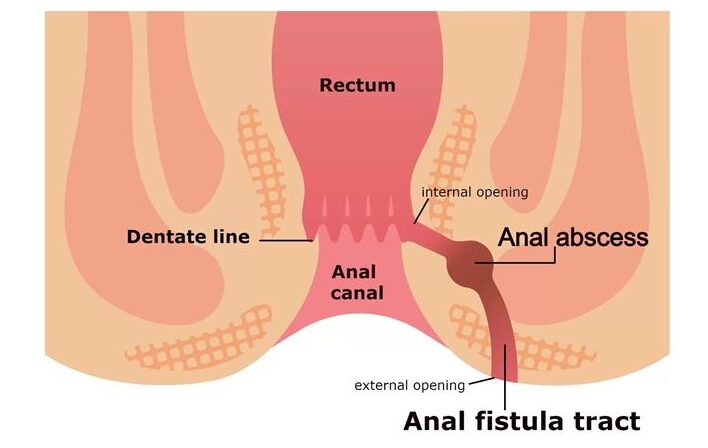Fistula – Complete Overview

Definition of Fistula
A fistula is an abnormal tunnel or tract that forms between two epithelial surfaces, commonly
between the anal canal and the skin around the anus. It usually develops due to infection or
inflammation in the anal glands, leading to persistent drainage and difficulty in healing.
Anal fistula is the most common type and is a chronic complication of an anorectal abscess.
Causes of Fistula
• Anal abscesses
• Chronic infection
• Inflammatory bowel diseases
• Trauma or surgery
• Tuberculosis
• Malignancy
• Radiation therapy
Symptoms of Fistula
Recurrent or persistent discharge of pus or blood
• Pain and swelling around anus
• Itching and irritation
• Discomfort during bowel movements
• Recurrent abscess formation
• Sometimes fever
Pathogenesis of Fistula
Infection of Anal Glands: Infection leads to abscess formation.
Abscess Formation: Pus forms in perianal/ischiorectal space.
Drainage: Abscess drains but may not heal completely.
Fistula Formation: Persistent tract remains.
Chronicity: Continuous discharge, repeated infections, fibrosis.
Types of Fistula
Fistula Type Path of the Tunnel (Simplified) Treatment Complexity
1. Intersphincteric The tunnel passes through the Inner anal muscle only and avoids the Outer muscle. Simple (Most Common)
2. Transsphincteric The tunnel crosses through both the Inner and the Outer anal muscles. Moderate (Often requires careful Kshar Sutra placement)
3. Suprasphincteric The tunnel goes above/around the entire sphincter complex. Complex
4. Extrasphincteric The tunnel is completely outside the sphincter muscles, often originating from the rectum.
Grades of Fistula
| Grade | Description |
| Grade 1 | (Simple): A straight, low-lying tract with no complications. |
| Grade 2 | (Simple with Abscess): Grade 1 fistula associated with an infected pocket (abscess). |
| Grade 3 | (Transsphincteric): The tract crosses both sphincter muscles. |
| Grade 4 | (Complex Transsphincteric): Grade 3 fistula with an abscess or multiple branching tracts. |
| Grade 5 | (Most Complex): Severe infection extending high above the muscles (Suprasphincteric/Extrasphincteric). |
Ksharasutra Therapy for Fistula
Ksharasutra Therapy for Fistula
Ksharasutra therapy is a classical Ayurvedic treatment used effectively to treat fistulas with minimal
complications.
What is Ksharasutra?
A specially prepared medicinal thread coated with alkaline herbal pastes such as Apamarga
Kshara, Snuhi latex, and Haridra. It has cutting, healing, and antimicrobial properties.
Procedure:
• Preoperative Assessment
• Anesthesia
• Thread Insertion
• Ligation and Treatment
• Weekly Thread Change
• Healing
Benefits of Ksharasutra Therapy
✔ Minimally invasive
✔ Preserves sphincter function
✔ Reduces recurrence
✔ Cost-effective
✔ Low complication rate
✔ Effective in complex and recurrent fistulas
✔ Natural and safe
Pre-Ksharasutra Therapy Precautions
• Complete bowel preparation
• Maintain good hygiene
• Avoid heavy meals & alcohol
• Inform doctor of allergies/conditions
• Stop blood thinners if advised
• Arrange for transport and care
Post-Ksharasutra Therapy Precautions
Diet: High-fiber diet, 2.5–3 liters water, avoid spicy & oily foods.
Hygiene: Regular sitz baths, keep region clean.
Activity: Avoid heavy lifting, prolonged sitting.
Medications: Follow prescribed medicines.
Follow-up: Weekly visits for thread change.
Avoid: Straining, smoking, alcohol consumption
